

Activities
Africa Solar Fund is a philanthropic organization formed to award and administer grants to nonprofit organizations engaged in charitable, public benefit work to relieve poverty in Sub-Saharan, East African Nations, including Burundi, Kenya, Malawi, Madagascar, Mozambique, Rwanda, Tanzania, Uganda, Zambia and Zimbabwe. Africa Solar Fund's primary objective is to aid these African regions in developing sustainable, solar and renewable energy technologies that improve the quality of life and economic opportunities for Africa's rural populations having no access to electricity.
There is a great need for sources of renewable energy in rural areas throughout sub-Saharan Africa where there are few electric lines and over 70% of the population is not served by an electricity grid. Some rely on costly and environmentally problematic generators and inefficient appliances. Most use highly polluting and dangerous kerosene lanterns for light, spending a significant portion of their limited resources on fuel. Currently there is little use of renewable energy technologies in these rural areas because the initial cost is high and it is very difficult and expensive to reach this population. Income levels are low and few people have the financial resources to purchase the equipment. Studies have shown that use of renewable energy sources for light can increase economic activity through extending the working day, increasing productivity, supporting educational and health care efforts, and improving environmental conditions.
By aiding organizations serving rural areas throughout sub-Saharan Africa with the development of clean, sustainable, renewable energy sources and energy-efficient technologies, Africa Solar Fund will advance its mission of relieving poverty and supporting economic development in this region.
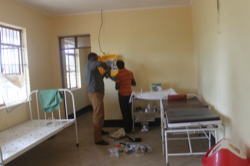 TanzSolar’s Program: Solar Health Care Facilities for Tanzania
TanzSolar’s Program: Solar Health Care Facilities for Tanzania
One of the primary goals of the TanzSolar Organization is the provision of power and energy efficient, high quality lighting to health care facilities throughout rural Tanzania. TanzSolar has chosen to install the We Care Solar - Solar Suitcases.
TanzSolar has launched this program in the Mara Region of northern Tanzania. This region has a total of 215 health care facilities, serving approximately 1.5 million people. The rural health care facilities serve the villages, and the vast 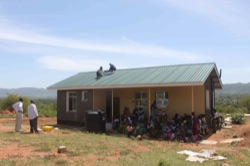 majority of these have no access to the electric grid and only kerosene lanterns or flashlights for lighting. These clinics are the only option most village women have for birthing assistance.
majority of these have no access to the electric grid and only kerosene lanterns or flashlights for lighting. These clinics are the only option most village women have for birthing assistance.
Africa Solar Fund has supported the first 10 such installations by TanzSolar. TanzSolar has installed the Solar Suitcase systems and trained the health care staff in the use of this equipment. In addition they are providing ongoing service and maintenance for these systems for a minimum of two years. TanzSolar partnered with We Care Solar, which provided equipment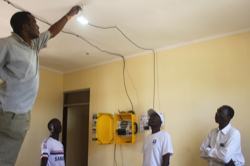 and staff training for TanzSolar staff.
and staff training for TanzSolar staff.
Given that there are over 60 health care facilities in the Mara region without any electricity, we hope to identify funding to provide clean, efficient, renewable solar power and lighting using the Solar Suitcase to all of these facilities over the next 1 - 2 years. Subsequently we envision expanding beyond the Mara region to the rest of rural Tanzania, where there are over 1,000 health care facilities without access to electricity.
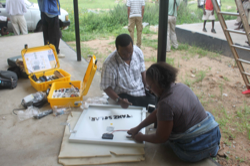
Currently in Tanzania approximately 53% of births take place at home , and there is very little prenatal care available. It is difficult for the health facility staff to assist in nighttime births when they do not have adequate light to see by. In addition, they do not have instruments to monitor the unborn baby. The Solar Suitcase addresses these needs with bright lights and a prenatal Doppler. Using this equipment the delivery is much easier and the heartbeat of the unborn child can be monitored for signs of distress.
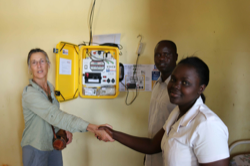 Physical Environment:
Physical Environment:
Typically there were 4 rooms, two of which had beds and were for treating patients, one office and one equipment storage room with a gas-powered refrigerator for vaccines. The roofs were metal and the buildings made of locally-made brick.
Lighting and power:
The centers generally had a kerosene lantern, and we were told that they would also use flashlights or cell phones for light to provide birthing assistance at night. Many of the larger Health Centers already have solar lighting, but very few of the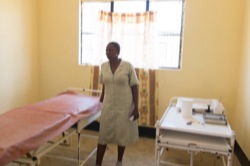 village health clinics, called “dispensaries”, had any source of electricity, not even a solar panel.
village health clinics, called “dispensaries”, had any source of electricity, not even a solar panel.
Equipment and services:
All of the health clinics visited had a gas-powered refrigerator for vaccines, and many mothers with small children awaiting vaccination. They had beds and simple tools, but were not set up or trained to provide cesarean sections. They used a simple tube to listen to the heartbeat of the fetus, but the mother could not hear it.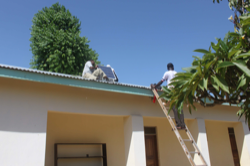
In our meetings with the local and regional Medical Officers we found a great deal of support for the program. They are acutely aware of the statistics and have formulated a plan to address the reduction of maternal and newborn mortality. The report states: “Since most maternal deaths occur around the time of delivery, and neonatal deaths within the first week of life, improving the availability and utilization of appropriate care around this time is imperative for significant achievements in reducing maternal and neonatal mortality.”
The Regional Medical Officer of the Mara Region was very supportive of the program to bring lights to the clinics as he confirmed that the biggest obstacle they face is getting the women to come to the local clinic to give birth, and having light would go a long way to encouraging this behavioral change and saving lives.
Donate to the Solar Health Care Facilities Program
In funding non-profit organizations serving rural Sub-Saharan, East African Nations including Burundi, Kenya, Malawi, Madagascar, Mozambique, Rwanda, Tanzania, Uganda, Zambia and Zimbabwe, Africa Solar Fund will help to provide much needed sources of renewable energy to those regions without access to electricity. Local communities in the targeted countries will benefit from the economic growth potential resulting from the provision of cleaner sources of energy and the ability to generate increased income locally through reduced fuel expenses and longer hours of productivity. The cumulative effect of providing clean sources of renewable energy is to reduce poverty and to improve the quality of life for people living in rural areas without electricity.
First Installation in the TanzSolar Solar-Schools Program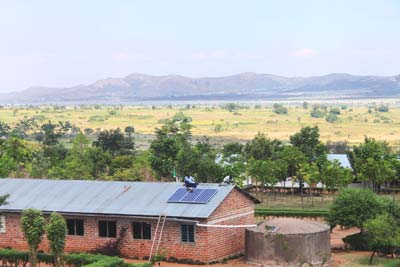
Report Date: December 2012
TanzSolar has completed the first Solar-School Installation in the Mara region in northern Tanzania. The project provides solar-generated electricity to a rural school; the Tegaruka Secondary School. This school, like all secondary schools in the Mara region, had no electricity and no access to an electric grid.
This is the first of many such planned installations, and was completed through the support of the US organizations Africa Solar Fund, Friends Foundation International, Kansha Foundation and the Clio Paul Foundation.
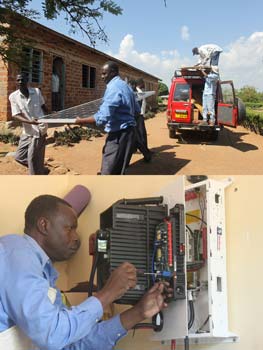 There is an education crisis in Tanzania, with only a small percentage of students
who attend primary school going on to secondary school, and even those students
are not receiving an adequate education in secondary school. Nationally
approximately 440,000 students start secondary school in Form 1 and only
approximately 20,000 make it to the final year of secondary school, finishing Form
6 (source). That’s less than 5%. One of the primary
reasons given by the teachers locally is that the students have no way to study in the
evenings.
There is an education crisis in Tanzania, with only a small percentage of students
who attend primary school going on to secondary school, and even those students
are not receiving an adequate education in secondary school. Nationally
approximately 440,000 students start secondary school in Form 1 and only
approximately 20,000 make it to the final year of secondary school, finishing Form
6 (source). That’s less than 5%. One of the primary
reasons given by the teachers locally is that the students have no way to study in the
evenings.
One report concludes “The biggest challenges facing these (public secondary) schools, whose students are mostly from poor families, include acute shortage of teachers, laboratories and books of all categories.” Tanzania Daily News,19 MAY 2012.
TanzSolar has performed a survey of several rural secondary schools in the Mara region, and has concluded that one of the highest impact strategies is to bring electricity and, eventually, internet access to these rural schools. The severe lack of qualified teachers is due, in part, to the remote locations and lack of services at these schools. Many of the teachers are housed on-campus with no access to power, not even enough to charge their mobile phones.
TanzSolar has provided a central photovoltaic system with batteries for storage and an advanced, internet-enabled inverter and charging system for the campus. This equipment is powering lights in 2, large classrooms for evening study and community events. There is security lighting for the campus as well as lights and outlets in the administrative office and the teachers lounge. In addition TanzSolar has installed smaller PV power systems for the teachers domiciles, providing LED lights and cell phone charging.
Mr. Mahende Matiku, assistant headmaster of Tegaruka Secondary School, has said that the entire community is very, very happy with the solar electric systems installed at their school. Now we will all be watching to see how the students test scores and teacher retention are impacted by this technological transformation.
Donate to the Solar Schools Program


